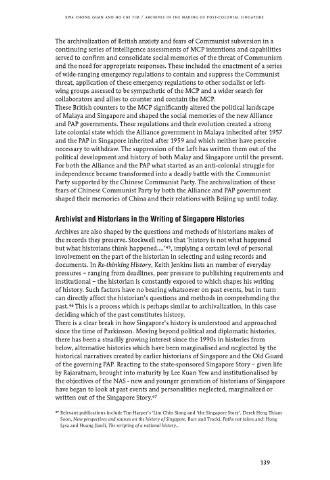The archivalization of British anxiety and fears of Communist subversion in a
continuing series of intelligence assessments of MCP intentions and capabilities
served to confirm and consolidate social memories of the threat of Communism
and the need for appropriate responses. These included the enactment of a series
of wide-ranging emergency regulations to contain and suppress the Communist
threat, application of these emergency regulations to other socialist or left-
wing groups assessed to be sympathetic of the MCP and a wider search for
collaborators and allies to counter and contain the MCP.
These British counters to the MCP significantly altered the political landscape
of Malaya and Singapore and shaped the social memories of the new Alliance
and PAP governments. These regulations and their evolution created a strong
late colonial state which the Alliance government in Malaya inherited after 1957
and the PAP in Singapore inherited after 1959 and which neither have perceive
necessary to withdraw. The suppression of the Left has written them out of the
political development and history of both Malay and Singapore until the present.
For both the Alliance and the PAP what started as an anti-colonial struggle for
independence became transformed into a deadly battle with the Communist
Party supported by the Chinese Communist Party. The archivalization of these
fears of Chinese Communist Party by both the Alliance and PAP government
shaped their memories of China and their relations with Beijing up until today.
Archivist and Historians in the Writing of Singapore Histories
Archives are also shaped by the questions and methods of historians makes of
the records they preserve. Stockwell notes that 'history is not what happened
but what historians think happened....'45, implying a certain level of personal
involvement on the part of the historian in selecting and using records and
documents. In Re-thinking History, Keith Jenkins lists an number of everyday
pressures - ranging from deadlines, peer pressure to publishing requirements and
institutional - the historian is constantly exposed to which shapes his writing
of history. Such factors have no bearing whatsoever on past events, but in turn
can directly affect the historian's questions and methods in comprehending the
past.46 This is a process which is perhaps similar to archivalization, in this case
deciding which of the past constitutes history.
There is a clear break in how Singapore's history is understood and approached
since the time of Parkinson. Moving beyond political and diplomatic histories,
there has been a steadily growing interest since the 1990s in histories from
below, alternative histories which have been marginalised and neglected by the
historical narratives created by earlier historians of Singapore and the Old Guard
of the governing PAP. Reacting to the state-sponsored Singapore Story - given life
by Rajaratnam, brought into maturity by Lee Kuan Yew and institutionalised by
the objectives of the NAS - new and younger generation of historians of Singapore
have began to look at past events and personalities neglected, marginalized or
written out of the Singapore Story.47
KWA CHONG GUAN AND HO CHI TIM ARCHIVES IN THE MAKING OF POST-COLONIAL SINGAPORE
47 Relevant publications include Tim Harper's 'Lim Chin Siong and 'the Singapore Story', Derek Heng Thiam
Soon, New perspectives and sources on the history of Singapore, Barr and Trocki, Paths not taken, and: Hong
Lysa and Huang Jianli, The scripting of a national history..
139

